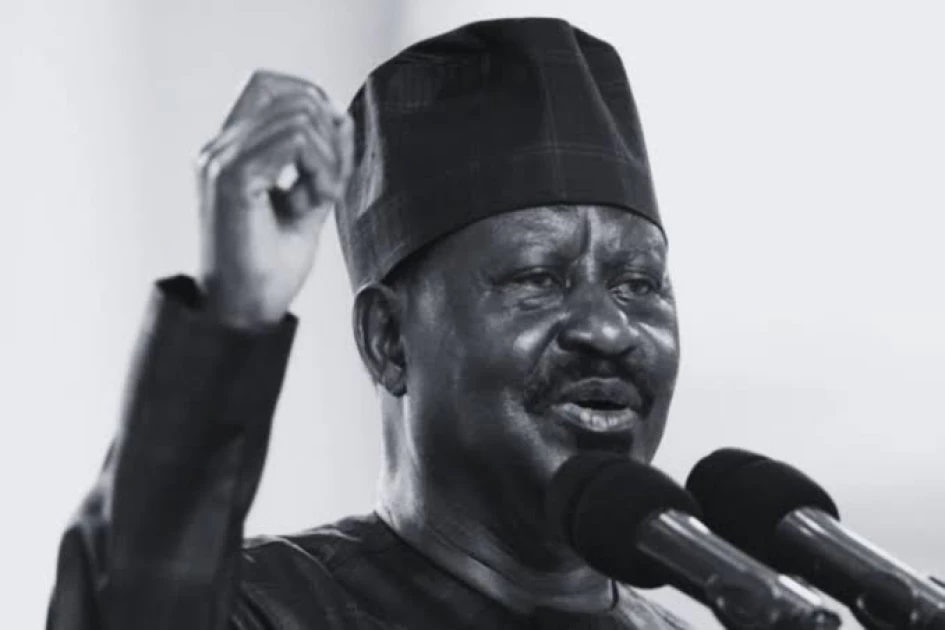Baba: The enigma, the charmer, the dynamo and the ultimate doyen


Audio By Vocalize
Baba is gone. The grand strategist, the swirling typhoon, the bürgermeister of realpolitick and the enigmatic powerhouse of the national political chessboard is gone.
Baba is gone.
These are words that perhaps no Kenyan had ever imagined they'd ever have to write, to share, to conjure up. It was almost unthinkable that Kenya would lose this sheer dynamo, this political bootstrapper, this charging live wire, this crushing bull.
To many, he was immortal; His very life was the fabric through which decades of Kenyan life were lived. And he's gone.
With his trademark smile, beguiling charm, inscrutable aura and fervent magnetism, Raila became the face of Kenya's political mesmerism; a revolutionary fireball who strode the opposition politics like a colossus - a thundering firmament, and the most brilliant exemplar of unrepentant insurrectionary zeal.
He was crushingly fearless in his politics. A paragon of brazen resistance to tyrannical rule and the shining rockstar of The Opposition.
From the early 80s, when he was first jolted into the public psyche, Raila embodied the fearlessness of the men living in the rugged years of dictatorship, absolutism, arrests, detentions and macabre State killings.
With unmatched gallantry and unparalleled proficiency, Raila defied President Daniel Arap Moi, looked him right in the eye, dared storm into his dreaded den and stood up to the then State horrors with striking courage and dashing valour.
Throughout the torturous 80s, frightful 90s and the spry 2000s, Raila became a symbol of resistance and an inspirational figure to dissent across Kenya - and East Africa. Through his heroics, detentions and dramatic forays into the despotic Moi fiefdom, he would become an eternal martyr to the righteous cause of national liberation.
A firm believer in his convictions and with a sacred calling to cleanse the nation of its stinking grime, Raila Odinga clothed himself in the emancipatory struggle, bringing along with him hundreds of devout acolytes who stood by him as he attempted to take on the increasingly inflexible Nyayo regime.
Even through the bloody beatings, the detentions, the daylight attacks and the callous machinations, he still soldiered on, bloodied, terrified, wounded, startled and badly mangled.
Singlehandedly, he launched a moral battle for the future of the nation, and, quickly, managed to galvanise the masses in ways reminiscent of the 1960s nationalism era.
He, like Fidel Castro before him, and after whom he named one of his sons, ruffled and rambled, shaking the very foundations of the nation - and with a candour and grit not witnessed before.
Alongside Martin Shikuku, James Orengo, Gitobu Imanyara and others, Raila would spend the early 90s in dramatic street clashes with the Moi security agents as he planned uprisings, marshalled his troops, defied oppression and appeared in courtrooms fist clenched, face taut, eyes menacing and spirit unbroken, ready to fight another day, ready to trigger some more tremors.
Armed with a silver tongue, a seductive mien, an entrancing presence and a divine ambience, Raila Odinga could leave thousands in the throes of his dizzying charm; He was the master crowd-puller, with his flowery language, sparkling zingers and witty anecdotes leaving crowds drenched in hypnotic awe.
He was, as aptly put in his own book, an enigma.
Although a member of the Luo ethnic group, Raila Odinga navigated the Kenyan political landscape with sheer dexterity and calculativeness, forging alliances with foes, anointing regional kingpins, enthralling the crowds, realigning his chances and closing ranks with, sometimes, odd bedfellows.
In 2002, at a charged Uhuru Park gathering, Raila would utter the immortal words: "Kibaki Tosha!" effectively upending the political trajectory and, with that singular announcement, causing a mighty tidal wave that would immediately torpedo Uhuru Kenyatta's chances and magnetically direct millions towards the Mwai Kibaki candidature.
It became his most potent moment of branding.
Astute at personal branding and accurate messaging, Raila Odinga mastered the art of political iconography, with his image, like that of Jomo Kenyatta or Dedan Kimathi, becoming a permanent fixture in the minds of Kenyans, young and old. Even without uttering a word, he would effortlessly move the masses with the sheer power of his visual propaganda.
As the years went by, Kenyans affectionately dubbed him 'Baba'. He was now not the gruff fellow in the gritty goatee and sprightly prance. He was now the second Father of the Nation, a champion of democracy, a symbol of national hope, the lord of national values and the valorous conqueror of the Kenyan soul.
Like Castro, his idol, he was Kenya's El Comandante. Men who refused to be bogged down by limitations, men who emerged at the right place and at the right time, men who moved with remarkable grit and steadfastness and men who became the talking point of a nation, for decades and decades.
Even after vying five times for the presidency and still not clinching the seat, Raila remained magnanimous in words and deed, holding hands with his rivals, sharing bread with his detractors, clinking glasses with his competitors and allowing the nation to forge ahead - despite the harrowing pain of watching his victories ebb away.
Even in his old age, Raila remained indomitable. Whether at political rallies or soccer matches, the charm still oozed freely, the magic still dazzled, the allure still gripped, and the wonder still sparked.
Baba is gone. The soundtrack of Kenya's political life is gone. And with him goes the spark, the glamour, the panache and the sparkle.
Jowi, Baba, Jowi. Till we meet again.


Leave a Comment